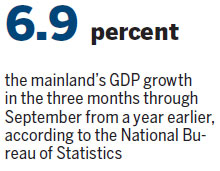RMB rides high on reserve ratio talk
Updated: 2015-10-21 07:37
By Bloomberg in Hong Kong(HK Edition)
|
|||||||||
The renminbi rose the most in a week on Tuesday, reversing an earlier decline, on speculation the mainland authorities propped up the currency after drops in the previous two sessions.
A few mainland banks sold US dollars in the onshore currency market, according to traders, spurring more lenders to follow suit. The US Treasury dropped its view that the yuan is significantly undervalued, but said it remains "below its appropriate medium-term valuation", according to a semi-annual report.
The onshore renminbi, which is restricted to moving a maximum of 2 percent either side of a daily fixing, rose 0.18 percent - the most since Oct 12 - to close at 6.3488 a US dollar in Shanghai, according to China Foreign Exchange Trade System prices.
The currency fell as much as 0.14 percent earlier following declines of 0.11 percent.
"The market chatter is intervention," said Sue Trinh, head of Asia foreign-exchange strategy at Royal Bank of Canada in Hong Kong. The weakening of the yuan in previous days "had gone too far for the time being for their liking" and the onshore rate looks expensive at current levels, she said.
The freely traded offshore rate in Hong Kong was steady at 6.3731 a US dollar as of 4:43 pm local time, after declining as much as 0.24 percent, according to data compiled by Bloomberg. The People's Bank of China cut its daily fixing by 0.14 percent to 6.3614.

The mainland's economy expanded 6.9 percent in the third quarter from a year earlier, the least since early 2009, a report showed on Monday. There will be one more 25-basis point cut in benchmark interest rates and a 1.5 percentage-point reduction in lenders' reserve ratios before yearend, HSBC Holdings Plc forecast the same day.
It's unnecessary to be anxious over the mainland's economic growth in the first nine months of the year, as it was within expectations, Xinhua News Agency said on its website on Monday. Positive signs are increasing and the economy has momentum, Xinhua said in a separate report, citing a meeting of the National Committee of the Chinese People's Political Consultative Conference.
"The market is concerned about the mainland's growth due to the weak data and risk appetite is lower," said Irene Cheung, a foreign-exchange strategist at Australia & New Zealand Banking Group Ltd in Singapore. "China's central bank will probably cut reserve-requirement ratios at least once more this year to stimulate growth."
China intervened "heavily" in the foreign-exchange market in the last three months, spending an estimated $229 billion to prevent the yuan from falling, the US Treasury said in its report. A test of China's new regime will be whether it allows the currency to "respond flexibly to appreciation as well as depreciation pressures", it said.
(HK Edition 10/21/2015 page16)